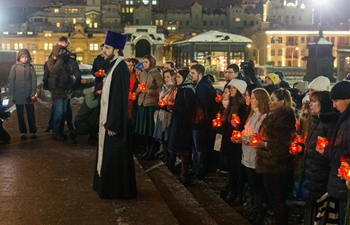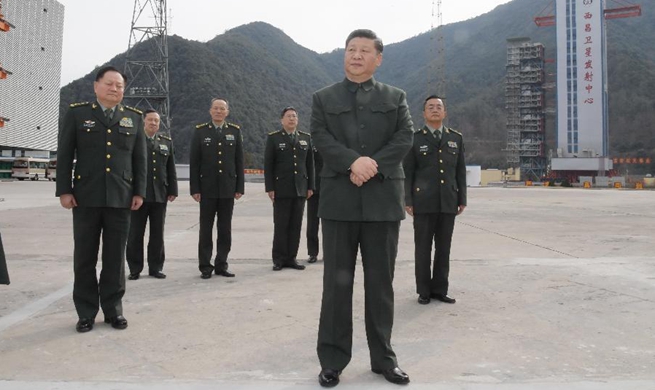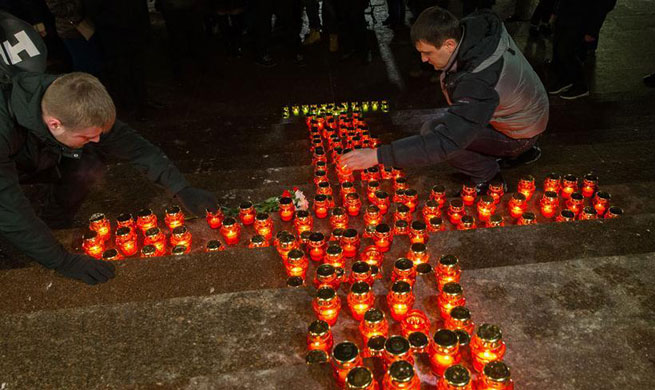By Burak Akinci
ANKARA, Feb. 12 (Xinhua) -- Turkey wants to improve strained and stalled relations with the European Union and will seemingly press for visa-free travel for its citizens during the upcoming EU-Turkey summit in Bulgaria's Varna in March.
Turkish President Recep Tayyip Erdogan will meet European Council President Donald Tusk, European Commission President Jean-Claude Junker and European leaders in the Bulgarian Black Sea city on March 26.
Last week, Turkey manifested determination to restart a new chapter in its ailing relationship with the European bloc by submitting a paper detailing Turkey's roadmap for the fulfillment of the remaining seven benchmarks of 72 criteria for visa liberalization in return for the implementation of the Readmission Agreement.
Ankara has made scrapping visa requirements one of the conditions for its deal with the EU, under which Turkey has largely stopped the uncontrolled flow of Syrian migrants from its soil to neighboring Greece.
Presidential Spokesman Ibrahim Kalin said that Turkey had fulfilled "all conditions" on free-travel to Europe, adding that the Turkish government hopes Brussels will respond to Ankara's willingness to improve ties.
The senior Turkish official spoke of "a new momentum to Turkish-EU relations."
"The 72 criteria for visa-free travel have been completed," Kalin told reporters in Ankara, without providing details, announcing that the pertinent documents were submitted for unrestricted travel in the 26 EU states comprising the Schengen Area.
SEVERE COUNTERTERRORISM LAW
The main bone of contention in this benchmark has been the definition of terrorism in the counterterrorism law that Turkey was called repeatedly to amend in order to comply with European democratic and judicial standards.
It was because of this counterterrorism law that negotiations between Ankara and Brussels could not be finalized back in 2016.
According to reports, a legal provision will be added soon to the current anti-terror law stating that "any critical expression that does not exceed the boundaries of journalism does not constitute a crime."
Ankara hopes that this provision will fulfill the required benchmark on the anti-terror law over which many journalists and academics have been jailed.
Serkan Demirtas, Hurriyet Daily News Ankara representative and a keen connoisseur of Turkey-UE relations told Xinhua that he has been told by European sources that "the EU Commission will now study the paper carefully."
"The paper, which was jointly prepared by Turkey's Foreign, EU, Interior and Justice Ministers, was submitted to the EU after receiving President Erdogan's approval," said Demirtas.
He added that it therefore reflects the will of the country's highest authority to further engage with the EU, and could be taken as a commitment of the Turkish government to broadening the boundaries of freedom of expression in Turkey.
Turkey claimed it needed a tough series of law to combat Kurdish rebels and supporters of the Fethullah Gulen, a U.S.-exiled cleric, accused of masterminding the failed coup. Tens of thousands of suspected members of his networks have been jailed, detained or suspended from public office despite European criticism.
"This may be the first time in a very long time that Turkey has taken a concrete step towards the EU, and it seems very much in accordance with the government's recently adopted policy of rapprochement with the EU after a rocky period," pointed out Demirtas.
FEARS OF MASSIVE ASYLUM
Some EU countries fear that if the visa barrier was lifted, there could be a risk that many Turkish nationals would leave their country to seek asylum in the EU amid a climate of crackdown launched after a botched coup in July 2016.
Diplomatic sources told Xinhua that in Varna, Erdogan is expected to press the bloc not only for visa-free travel but also for improvements in the custom union agreement that Ankara considers as being imbalanced and for more financial assistance for Syrian refugees.
Turkey is hosting some 3.5 million displaced Syrians that have fled the war in their country since 2011 and has repeatedly accused the EU of not honoring quickly enough its financial promises amounting to 6 billion euro (7.3 billion U.S. dollars) for the refugees. Erdogan announced that Turkey has spent some 30 billion dollars for refugees.
Turkey, a NATO member with an overwhelming Muslim population, started EU accession negotiations in 2005, but these talks have not yield effective result partly because of some countries' opposition to a full membership, and have finally been suspended after the failed coup of 2016 which prompted a controversial emergency rule in Turkey, still enforced as today.
In recent months, Erdogan visited France, Greece and Italy, signaling that his country is ready to mend ties with the bloc amid a sharp decline of pro-European fervor amongst Turks.
According to a poll conducted in January by research firm MetrPOLL, a majority of Turks (52%) said that "Turkey should not be a member of EU," compared to more than 70% in favor of an accession ten years ago.
Nevertheless, if both the EU and Turkey seem to refrain from mutual harsh rhetoric, it is obvious that human rights and democratic principles issues remain at the core of the European vision.
Experts argue that Turkey needs to do more in terms of democratic reforms through concrete measures to upgrade its democracy, rule of law, and fundamental freedoms, principles who took a blow in the wake of the abortive coup plot.
Ties further deteriorated after a constitutional referendum that led to the considerable strengthening of President Erdogan's powers in April 2017.
Some experts argue that instead of pushing for a full membership, which is a dead end, Turkey and EU should revamp their customs union.
This is "the only viable way for the EU to encourage rules-based economic and political reforms in the country (Turkey) and maintain engagement with Ankara," remarked EU expert Sinan Ulgen, in a recent paper for the American international affairs think tank, Carnegie Europe.
"Given that the Turkey-EU political relationship is in deep crisis with no real prospect of recovery in the foreseeable future, a failure to upgrade the customs union with Turkey would be counterproductive," noted Ulgen, reminding that the prevailing customs union regime dates back to 1995 and needs an overhaul.
Yet in Ankara, the government insists that only a full membership can be on the agenda, rejecting all other options.
"We have done all that has been asked from us and yet we are still being kept at the door of the Union for decades. This is grossly unfair for the Turkish people who are frustrated with this process," said a government source to Xinhua. "Turkey deserves a full membership and nothing else."

















